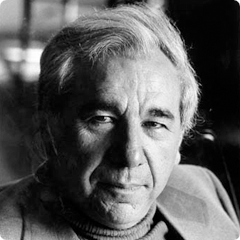 |
 |
| |
 |


|
 |
"I was a literary radical, indifferent to economics, suspicious of organization, planning, Marxist solemnity and intellectual system building; it was the rebels of literature, the great wrestlers-with-God, Thor with his mighty hammer, the poets of unlimited spiritual freedom, whom I loved--Blake, Emerson, Whitman, Nietzsche, Lawrence."
Alfred Kazin (1915–1998)
Author and Literary Critic
MA 1938
LHD (hon.) 1959
The compelling perspective of Alfred Kazin has focused American prose for readers since 1942. Known first for his opinionated and perceptive criticism of contemporary culture, Kazin was also a public figure whose voice and wide-ranging erudition are perhaps most apparent in his multiple memoirs and journals, including A Walker in the City (1951), Starting Out in the Thirties (1965), New York Jew (1978), and A Lifetime Burning in Every Moment (1996). As an undergraduate at City College, Kazin wrote book reviews for The New York Times; after his graduate work at Columbia, he received a Guggenheim fellowship that allowed him to complete On Native Grounds (1942). The book made Kazin an instant authority on early 20th-century American literature, an authority he sustained by assessing American prose in copious journal articles, Paris Review interviews, Bright Book of Life (1974), and numerous edited classics. In the words of scholar Richard Cook, "Kazin wrote his criticism as he wrote his autobiographies, out of a fullness of personal response that derives its interest from something more than critical insight and technical competence, that pleases (or angers) his readers as a distinct personal voice, a particular combination of feeling, prejudice, vision, and intelligence, which is always consistently itself."
|
 |
 |
 |
 |
Early on, Kazin was connected with a highly visible set called the New York intellectuals, whose number included Lionel Trilling, Sidney Hook, and Edmund Wilson and whose cultural criticism leaned always to the left. His relationship to this group and their perspectives changed during his lifetime, but his voice–thorny, individualistic, and slightly romantic–stayed rooted in New York. Indeed, Kazin's work draws on his origins among Jewish immigrants in Brooklyn's tough Brownsville section–a world, he writes, that created his love of language: "I read as if books would fill my every gap, legitimize my strange quest for the American past, remedy my every flaw, let me in at last into the great world that was anything just out of Brownsville."
Though Kazin's studies at Columbia were anomalous–it was the only non-public education of his life–and brief, his time in Morningside stands as an important episode in his life. It was there that Kazin studied with Carl Van Doren (brother of Mark Van Doren and literary editor of The Nation), who encouraged him to begin his initial study of American prose in 1938, work that would eventually make Kazin's career.
|
 |
|
 |
 |
|
 |
|
